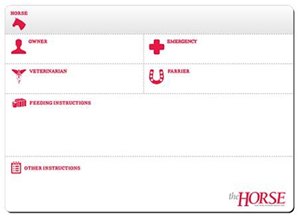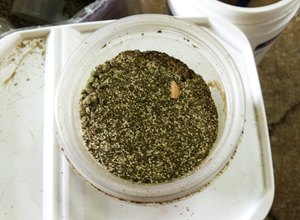Preparing Seniors for Horse Sitters
I love to travel and take exciting vacations. I love seeing new places, experiencing new things, and tasting new cuisine. The problem? I hate leaving my horses behind…especially the aging ones. But my job involves traveling to conventions across the country, so I’ve gotten used to leaving Dorado in capable hands while I’m away. This is good news, since I’ll be taking an exciting trip next week—my honeymoon!
The first trip I had to take while leaving Dorado in the hands of his caretakers at his boarding barn was horrible…I worried about him all day, every day. And while I still hate leaving him behind, each subsequent trip has been easier because I keep coming back to a happy and healthy horse—with the exception of the trip I took when he was on stall rest last year; that was not a fun trip. Anyway, I now have a routine down pat that I use to prepare to leave him in someone else’s care. Here are some steps that I—and my parents—take when we’re preparing to leave our senior horses in someone else’s care, with some extra tips from The Horse regular contributor Dr. Stacey Oke (DVM, MSc).

I always ensure my horse’s “guardian” has access to all of my horse’s emergency contacts—such as the veterinarian, farrier, and other professionals—by leaving their information on a stall card like this one.
Photo: The Horse
First, even though Dorado resides at a boarding barn so he has numerous people checking on him throughout the day, I always leave an emergency contact in charge before I leave. For this trip, I’ve selected my good friend Kristen, who boards her horse across the aisle from Dorado and is well-versed in caring for older horses—in addition to her young off-the-track-Thoroughbred at the barn, she has two horses (one senior) at home whom she cares for daily.
When choosing a caretaker or emergency contact, Dr. Oke offered some solid advice: “A willing friend who won’t charge for their time but who isn’t very savvy when it comes to the day-to-day management of a horse, especially senior horses, might not be the best bet. Find a nice way to say thanks, but no thanks, and (consider hiring) a professional horse sitter.”
Next, I always ensure my horse’s “guardian” has access to all of my horse’s emergency contacts, such as the veterinarian, farrier, and other professionals. My veterinarian’s and farrier’s phone numbers are permanently posted on Dorado’s stall card whether or not I’m out of town or not. I also always ensure that my horse’s caretaker has written permission to make veterinary decisions on my behalf if I can’t be reached.
“Having it in writing that the caretaker is allowed to make decisions for the owner would be a good idea, and have a copy of the letter sent to the regular veterinarian so they know in advance would also expedite matters in an emergency situation,” Dr. Oke suggested.
For example, my parents were driving back to Michigan from Kentucky after attending the Rolex Kentucky Three-Day Event in 2012 when they received a phone call from the horse sitter: a large piece of debris had struck our then 25-year-old Appaloosa mare in the head over night, and she had a large gash in her forehead. The veterinarian was on his way and would start treatment upon his arrival. Mom and Dad arrived home about six hours later to find Jessie all stitched up—and screaming for food.
For less serious wounds, it’s always smart to ensure your horse’s caretaker has access to your equine first-aid kit. I know Kristen is experienced in caring for wounds, but I’ll still give her a quick rundown of where all my medical supplies live and will point out any concerns I might have about Dorado’s health before I head out. This time, I know Dorado will be getting close to needing his shoes reset by the time we arrive home, so I’ll ask her to just watch for loose shoes and to let me know if any develop so I can schedule an appointment with the farrier for as soon as we return.

Dorado’s medication and supplements are easy: I prepare everything ahead of time and leave each in a small container, which is then mixed in his breakfast each morning.
Photo: Erica Larson
And my family and I always ensure our horses’ caretakers are well-versed on which horses need supplements or medications on a daily basis, and that they are completely clear on how to administer them. For instance, Dorado’s medication and supplements are easy: I prepare everything ahead of time and leave each in a small container, which is then mixed in his breakfast each morning.
Other supplements and medications aren’t that simple: Brandy, our 24-year-old Miniature Horse, for example, needs pergolide and isoxsuprine each day, and she’s not always willing to consume it all without a fight. And as Dr. Oke points out, pergolide shouldn’t be exposed to sunlight or stored in very high temperatures, so we always make sure that the caretakers are clear on where to keep her pergolide between feedings (in our barn’s medicine cabinet) and how to ensure she gets the full dose (basically, Brandy’s a pig—if she doesn’t eat all her food with the medicine mixed in on the first try, she just doesn’t go outside until she does so. This doesn’t happen frequently, but when it does she usually cleans her bowl within a half-hour).
Likewise, our senior Appaloosa gelding Taz required ophthalmic drops daily to help keep his uveitis in check and he needed to wear a fly mask every day during the last few years of his life. He was typically very agreeable to these drops being administered, but we were always sure our horse sitters were clear on how to administer the drops and made sure they understood the importance of him wearing his mask.
Some other good points to consider:
- Dr. Oke suggests having your horse’s full medical records on hand in the event of an emergency. Especially if the veterinarian treating your horse in a pinch isn’t his regular vet, having a history of previous medical conditions can be hugely helpful.
- Ensure your caretaker has access to your truck and trailer, or arrange for them to have access to a rig if you don’t own one, in case of emergency.
- Dr. Oke always suggests having a back-up caretaker in case your primary caretaker has an emergency, or needs a second opinion in the event of an emergency.
- Also, if you’re having someone exercise your horse while you’re away, leave detailed instructions on what you’d like done, what they should and shouldn’t do, and any health problems that might impact your horse’s ability to exercise (such as arthritis or heaves).
It might seem daunting on paper, but in reality ensuring your senior horses are in good hands while you’re away comes down to a few simple steps. I’ll definitely be taking all the aforementioned steps before I leave on my honeymoon to ensure Dorado is in the best hands possible in my absence.
How do you prepare to leave your senior horses with a sitter?
Leave a Reply